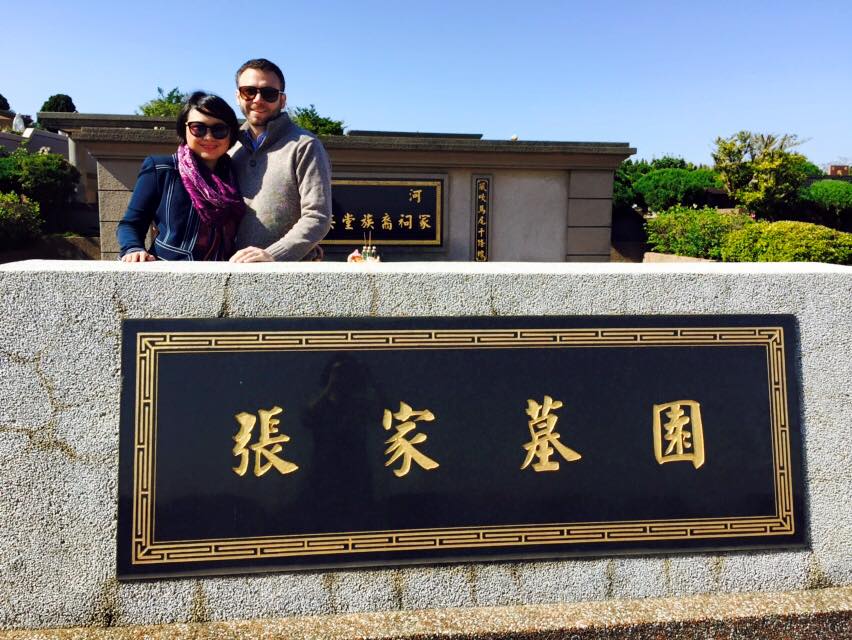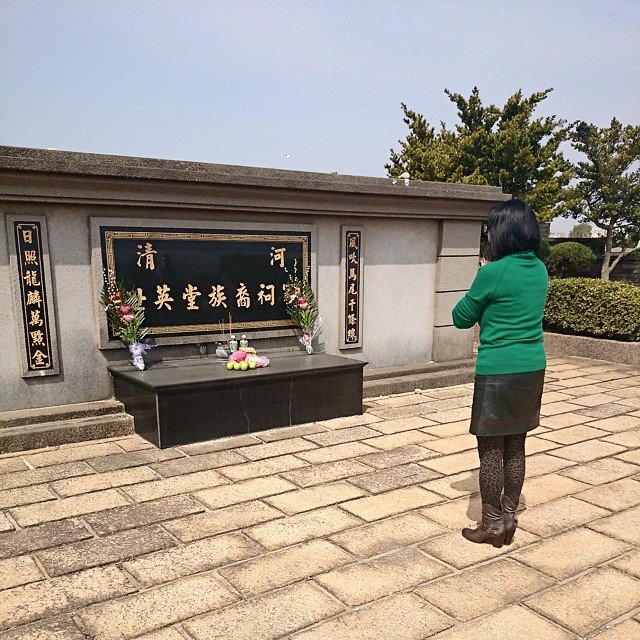Dear Reader, this post is part of a three-part series. Please read Part I and Part II before proceeding.
After we visited the temple and the columbarium on the first day of the Chinese New Year, my family always visit the Chang mausoleum with offerings and freshly cut white Chrysanthemum. To get there, Baba droves us through the scenic cemetery ground, which has small, winding roads with proper street names. I felt like a tourist visiting the City of the Dead.

The Chang burial plot is marked by a large, black granite plaque with dignified golden Chinese characters. The mausoleum itself is shaped like a stone house, surrounded by an open, paved space. In front of the mausoleum is an altar. To the right of the house-like tomb is the shrine of two gods: the god of Feng Shui, and the god of earth.
In the Abrahamic tradition of Christianity, Judaism, and Islam, there is only one god. However, in the Chinese folk religion, there are multiple gods, such as Buddha, the enlightened one, the goddess of the sea, Mazu, and Guan Yin, the Bodhisattva of compassion. When Mama is concerned about my grades or my career prospects, she pays Wenchang Wang a visit, who is the god of culture and literature. Another important deity for the Taiwanese soul is the ancestors, which consists of the older generations, all the people who are responsible for our existence. When an elder passes away, he or she joins the ancestors and become a god. They are vital as they remind the living of our roots while protecting and blessing their decedents.
On the left side of the ground, there is also an imposing plaque made of black granite. With golden Chinese characters, it illustrates the story of my ancestry. In the year 1721, the first male Chang in my bloodline, from a village just outside of Xiamen, Fujian, crossed the Taiwan Strait and migrated near Taichung, near the west coast of Taiwan. Since then, the Changs have blossomed and spread. In the early 90’s, Agon and his brothers bought the burial ground and erected the mausoleum in its current location to enable the future generations to honor our ancestors and to remember our origin. Currently, it is the final resting place for at least three generations of Changs, dating back to Agon’s parents.

To prepare for the worship ritual, Derek helped to unload the rest of the offerings, and we distributed them between the god of Feng Shui the god of earth and the ancestors. We stacked the food offerings neatly in each area, but the fresh flowers are always reserved for the ancestors. Mama lit the incenses and gave each of us three sticks. Then, we went around to the different gods and the ancestors and asked for their blessings. After we finished praying in each area, we put one of the incense sticks in the little pots next to their plaque. We worshipped the ancestors last, and Mama talked to them:
“Dear ancestors, Kayo has brought her husband Derek to see you. Please bless them and ensure that they are healthy and successful in their careers.”
Mama closed her eyes as she prayed, her palms in front of her chest. Then, she tossed a couple of coins on the ground. If the coins came up with different faces, this meant that the ancestors were happy. If they come up with the same faces, Mama would have to pray again and toss the coins until the ancestors indicate that they were satisfied. After that, we stand around the stone fireplace and burn joss papers.
“Burn those first,” Mama said pointing to a stack of joss paper wrapped in red rubber bands. There are many stacks, but the ones we burn first are the special ones with Sanskrit verses in Chinese characters written inside a large circle shaped like an old Chinese coin.
Joss papers are money for the dead, and we burn them to ensure that our ancestors have the means to live comfortably in the afterlife. Mama said we should touch every piece of the paper, which guarantees their validity in the heavens. I took off the rubber band and carefully folded the first piece of the rough yellow paper. I made a bundle of five or so pieces and fed them into the vibrant flames. Derek followed suit. We repeated the process until the whole stack was gone, and I reached for another one. After the first stack, the rest of the joss paper is less fancy—they are smaller and decorated with a tiny gold or silver foil paper glued in the center. Derek and I continued to toss the joss paper, and we watched as they fluttered in the fire, consumed by flames, turned black and reduced to ashes.
After we burn all the joss papers, we headed home. While driving through the City of the Dead, we drove by Mama’s younger brother, my Uncle Freddie and his wife, my Aunt Christine. Baba stopped the car as Freddie rolled down his window, and exchanged pleasantries. Mama and Aunt Christine spoke over their husbands in their respective passenger seats. Before we drove away, Aunt Christine said, “see you at our place tomorrow.”
Even though Mama’s family’s burial plot is in the same cemetery, only a few blocks from ours, she was never invited to worship there on the first day of the New Year. Superstition dictates that a married daughter would bring ill fortune to her maiden home on the first day of the New Year’s. The family tomb, which houses the ashes and the spirits of the ancestors, is also considered “home.” We always saw Mama’s family on the second day of the New Year, which is reserved for married daughters to return home with her husband and children.
Ironically, as a married daughter, with an American, Christian husband, I have been going home and worshiping the Chang ancestors on the first day of the Chinese New Year’s. My parents’ desire to see me and Derek is stronger than superstition—I like knowing that their love for us is stronger than their beliefs in ill fortunes. I like that Mama and Baba are a little rebellious in defying tradition. I also like to partake in this defiant act.
Mama typically frets this time of the year. While we were burning joss papers, she looks anxious, “You are going to come back and visit us after we die, aren’t you?”
When I was younger and lived far away, I never even considered it. I also thought ancestor worship reeked of patriarchy and superstition. Also, I hated being reminded of Mama’s morality. Logically, we all know that our parents will die one day, but I hate it when she forces me to think about it on an annual basis.
Lately, my perspectives on ancestor workship have been shifting. Based in Hong Kong, I am barely two hours away by flight. I also start to appreciate many aspects of the tradition. I love spending time with my parents, and I like feeling connected to my ancestry and knowing that I came from somewhere. Yes, it’s patriarchal and superstitious, but it seems that my parents are more fixated on the positive aspects of the traditions. Even Derek is interested in the rituals and has been prompting me to explore. Although looking after the ancestor’s is supposed to be my brother Davis’ job, it’s more likely that Derek and I will remain in Asia and will take over the duty. Like Ama, I will be in charge of a role traditionally assigned to a man, which is something I think is another defiant act I could partake.
Looking at Mama’s anxious face, I said, “of course I will, Mama,” I reassured her by giving her shoulder a little squeeze.


i love reading these Kayo, you are the first person in 18 years to offer insight into something which surrounds all of us foreigners who live here.
As a mortal it makes me feel sad us white people don’t follow the same traditions as if nothing else it offers a chance to reflect and think about the departed.
Thanks